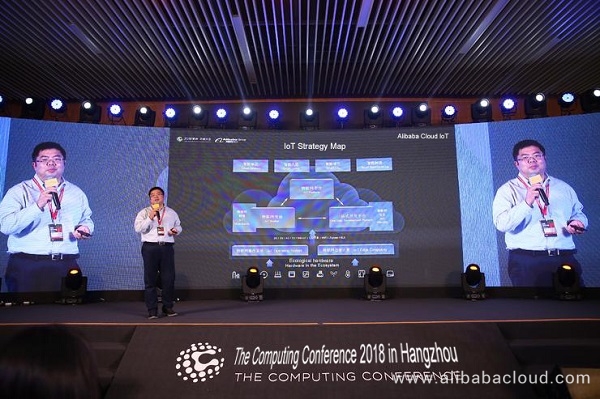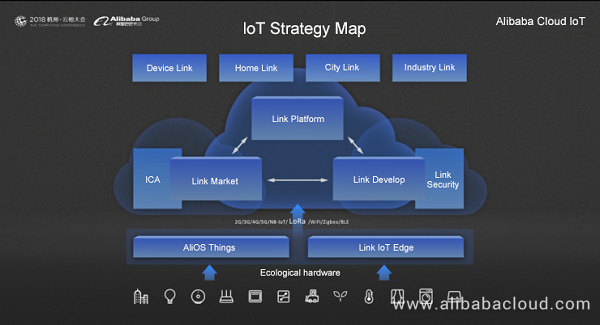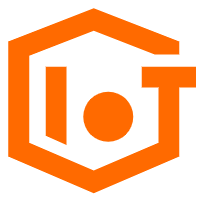We believe that computing should be ubiquitous from the IoT to the Internet of Beings (IoB), and that computing power should flow seamlessly, whether it is in the cloud, the edge, or on the device side. To this end, we have built a cloud-edge-device integrated IoT system.
According to www.leiphone.com, Alibaba's Senior Vice President Hu Xiaoming announced at The Computing Conference Shenzhen Session held in March this year that Alibaba will fully enter the IoT market. IoT will be Alibaba Group's fifth main track, following e-commerce, finance, logistics, and cloud computing.
Hu Xiaoming said that Alibaba Cloud IoT is positioned as the builder of IoT infrastructure, and Alibaba Cloud plans to connect 10 billion devices to the IoT in the next five years. In addition, to cope with new challenges brought by the IoT, Alibaba Cloud will strategically invest in the emerging technology of "Edge Computing" in 2018 to create the world's first "ubiquitous cloud."
At the conference, Ku Wei also described the current application and open capabilities of the Alibaba Cloud IoT platform:
So far, the entire Alibaba IoT platform can support over 95% of communication protocols, and over 1,000 models have been built on the platform for everyone to use. A total of 1,300 APIs are available for use by developers and our partners.
The following is General Manager Ku Wei's speech given at The Computing Conference Hangzhou Summit, which was edited by www.leiphone.com.

In March this year, Alibaba's Senior Vice President Hu Xiaoming announced that Alibaba will fully enter the IoT market, and IoT will be the new main track of Alibaba Group following e-commerce, finance, logistics, and cloud computing. In fact, I was under "great pressure" on this main track. Therefore, I hope all of our partners here can work together, as all of us are players on this main track.

Many people may ask: What is Alibaba Cloud IoT doing? The picture above best shows what we are doing. Essentially, the IoT collects data through southbound devices, processes data through the IoT platform, IoT market, and one-stop development platform, which are what we focus on, and then provisions the processed data for users through northbound applications.
First of all, to support this data-to-application process, we have built a cloud-edge-device integrated platform. On the cloud side, we have built the IoT platform, the IoT market, and the one-stop development platform, equipped with IoT security and IoT standard systems.
On the edge side, we have built an IoT edge computing product, Link IoT Edge. We also have our own AliOS Things operating system on the device side. We believe that computing should be ubiquitous from the IoT to the IoB, and that computing power should flow seamlessly, whether it is in the cloud, the edge, or on the device side. To this end, we have built a cloud-edge-device integrated IoT system.
Based on the IoT platform, we started the research and development in April 2017 and have been iterating on the system. We have invested a lot of manpower in this section. I believe the IoT capabilities are our most important infrastructure. Capabilities on the cloud and edge sides are the IoT infrastructure built for the IoT partners and IoT developers. We have made device connection, device management, data analysis, and service integration more stable, more flexible, more perfect, and more intelligent through the iterative updates of versions.
So far, the entire Alibaba IoT platform can support over 95% of communication protocols, and over 1,000 models have been built on the platform for everyone to use. A total of 1,300 APIs are available for use by developers and our partners. We are constantly iterating on the IoT platform capabilities based on market needs and customers' requirements.
In fact, for IoT developers, platform capabilities are still not enough to solve difficulties in development, so we make updates on the development platform at the same time. The development platform is a tool platform. Today's Internet developers have mature development tools and platforms. However, IoT developers are facing great difficulties in the development process.
Our latest IoT development platform version 2.0 was launched last week. The platform is built based on four workbenches, namely, the Device Development Workbench, the Web Application Workbench, the Mobile Application Workbench, and the Service Orchestration Workbench. The purpose is to enable IoT developers to develop applications more efficiently, more conveniently, and faster, and to develop a variety of IoT applications that are easy to use. Our entire development platform targets 23 development links of the IoT including over 50 service components, and supports embedded GIS applications, thus enabling Internet developers to develop an IoT application in five minutes without changing their work habits.
The Device Development Workbench provides multiple embedded tools, and the Web Application Workbench helps to quickly build all the IoT web applications. The Mobile Application Workbench, which has various SDK visual components, makes the development of IoT mobile applications easier. We hope that more and more developers can make use of Alibaba Cloud IoT's capabilities and our development platform tools to build more IoT applications in an easier, more convenient, and low-cost manner.
Recently, Alibaba has a popular project on the Internet—the IoT Network Management Platform. Alibaba hopes to build such an infrastructure for WAN access, so that everyone can access the WAN in an inclusive, convenient, and easy way. To ensure that all AP devices and WAN devices can access the Alibaba IoT platform and use it, we have launched the IoT Network Management Platform. The platform features autonomous and controllable lightweight management, gateway management, and node management, and supports accurate metering and billing. We will make it available to all LoRa-based gateway developers and enable all LoRa APs to access to the platform.
Technical standards can help the entire LoRa network to finish the deployment of campus gateway testing within an hour. The construction cost is greatly reduced and millions of connections can be realized concurrently. Application developers can use the universal protocol to connect to Alibaba Cloud IoT on the cloud side in three steps, and we are now supporting over 20 manufacturers of LoRa gateway devices.
The following describes Alibaba IoT's three major businesses.
Smart Home
We constantly intellectualize household appliances in smart home scenarios. As you know, our team started from smart household appliances. For many years, we have manufactured 30 to 40 million smart home items in hundreds of categories and have connected them to the Alibaba IoT platform. In fact, we believe that if an item cannot realize its value through scenario-based intelligence, it may never really benefit a smart life. Now the entire smart home business provides smart household items in over 100 categories and smart scenario solutions for 30 application scenarios, with over 50 sets of services are available to the public.
We used to emphasize indoor smart scenarios. However, in the future, the entire community environment will be fully intelligent. We have cooperated with almost all domestic mainstream real estate developers in this area. I believe that more and more smart scenario solutions will be applied to the next-generation home items.
Smart City
Smart city is currently a very influential business. We already have over 240 ecological partners and over 35 application scenarios. Moreover, we have over 1,000 software and hardware solutions and we have participated in a large number of smart city transformation projects in Xiong'an, Wuxi, and Hainan. Today, the case I am talking about is the Future Sci-tech City project of Yuhang District (where Alibaba is headquartered) that we have done under the request of the Yuhang District government. The first phase of the project was just delivered, and the utilization rate of idle parking space in Yuhang District has increased by 90%. Moreover, the efficiency of urban inspectors' intelligent inspection has increased by over 60%.
Industrial Internet Platform
The industrial Internet platform is our new business. We believe it is a very valuable business. At present or in the next ten to twenty years, the extent and depth of the implementation of intelligent manufacturing will determine how well many industries can survive. Currently, the entire Internet platform of the intelligent manufacturing industry covers 10 industries with over 500 ecological partners.
What we have been thinking about is that if China intends to develop from a big manufacturing country to a powerful manufacturing country, small- and medium-sized factories at the bottom of the pyramid must improve their production efficiency, digitization capabilities, and intelligence level.
We have cooperated with 1688.com, which is a platform that gathers many sellers on taobao.com and factories with orders. Many upstream users go there to seek downstream manufacturers. However, since the orders are placed in a highly digitized and precise manner, it is very difficult for the factories to meet demand. We made a preliminary digital transformation and the overall order fulfillment rate increased by 4%.
In fact, there are tens of thousands of such factories in China, and over 50,000 factories sign contracts directly with 1688.com. The 10% increase in the production scheduling and order fulfillment rate brings a significant increase in the net profit, because the marginal cost remains the same. If the production capacity of 50,000, 100,000, and even hundreds of thousands of factories can be digitized, and upstream orders can also be digitized, then we can link the upstream and the downstream. We have already seen some initial progress. For the clothing industry, blind production may entail great risks. Therefore, Alibaba will continue this project.
On the edge side, Alibaba Cloud IoT and Intel are working closely together in the IoT field. The two parties have integrated their respective advantages in cloud and edge computing to roll out integrated edge computing products for global enterprises. (For more information, see Alibaba Cloud IoT Is Working with Intel on the Edge of the IoT.)
All in all, the IoT will be an ecosystem where everyone works together. Over 3,000 companies have entered the IoT market. There are already over 20,000 integrated software and hardware solutions available, and the maximum number of daily unique visitors (visits) has exceeded 20,000. We hope to drive the transition from the IoT to the IoB at a faster pace.
To learn more about Alibaba Cloud IoT solution, visit www.alibabacloud.com/solutions/IoT.

2,599 posts | 765 followers
FollowAlibaba Clouder - October 15, 2018
Alibaba Clouder - September 20, 2018
Alibaba Clouder - November 28, 2018
Alibaba Clouder - July 5, 2018
Alibaba Clouder - October 15, 2018
Alibaba Clouder - November 26, 2018

2,599 posts | 765 followers
Follow IoT Platform
IoT Platform
Provides secure and reliable communication between devices and the IoT Platform which allows you to manage a large number of devices on a single IoT Platform.
Learn More IoT Solution
IoT Solution
A cloud solution for smart technology providers to quickly build stable, cost-efficient, and reliable ubiquitous platforms
Learn More Global Internet Access Solution
Global Internet Access Solution
Migrate your Internet Data Center’s (IDC) Internet gateway to the cloud securely through Alibaba Cloud’s high-quality Internet bandwidth and premium Mainland China route.
Learn More Function Compute
Function Compute
Alibaba Cloud Function Compute is a fully-managed event-driven compute service. It allows you to focus on writing and uploading code without the need to manage infrastructure such as servers.
Learn MoreMore Posts by Alibaba Clouder
Raja_KT March 8, 2019 at 7:19 am
Interesting Link IoT Edge, Link WAN ... would love to hear more